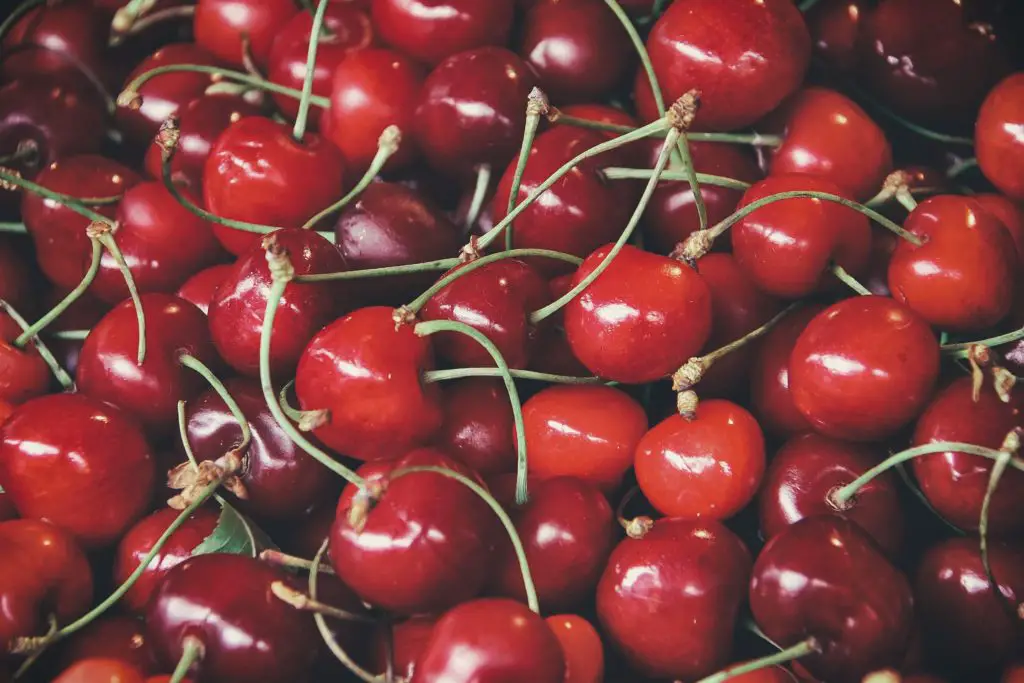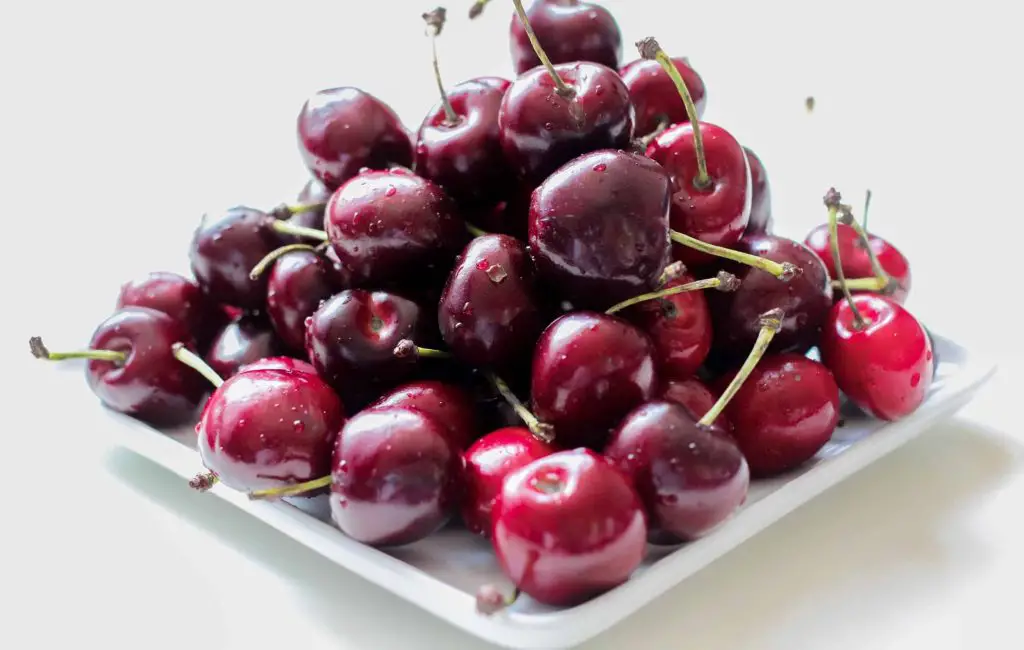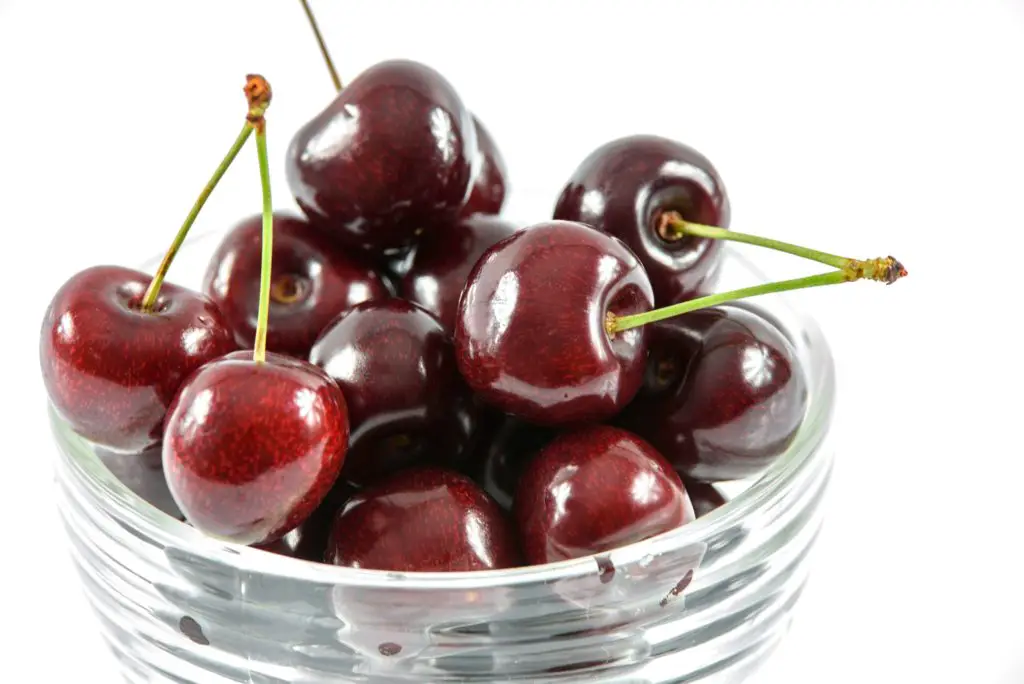Cherries are a delicious, often seasonal fruit enjoyed raw or cooked into baked goods. Dog owners often like to share delicious whole food with their canine companions. At the same time, you want to always make sure it is not harmful for your dog.
While some food is nutritious and considered safe to consume, other food should be eaten with much caution. When asked, can dogs eat cherries, the answer is not straight forward.
The big question is, can dogs eat cherries? Cherries do contain wonderful antioxidants and vitamins however much about this little fruit can be toxic to dogs. Some dog owners steer clear of cherries all together while others are very careful about sharing fruit with their dogs.
In this article, Can Dogs Eat Cherries?”, you will learn about the nutrition found in cherries and the huge red flags concerning dogs and cherries.
- Use Extreme Caution with Dogs & Cherries
- Cyanide Poisoning in Dogs
- Nutritional Value of Cherries for Canines
- How to Safely Feed Dogs Cherries
- Cherry Alternatives

Related Articles:
- The Best Canned Dog Food for Dogs with Sensitive Stomachs
- A Review Of The Top 5 Best Tactical Dog Harnesses
- How to Build an Outdoor Dog Potty Area on Concrete
- A Review of the 5 Best Dog Muzzles
- A Review Of The Top 5 Best Dog Clickers
Can Dogs Eat Cherries? Use Extreme Caution with Dogs & Cherries
There are a few important reasons for not giving a direct answer to, can dogs eat cherries? The main reason being the pits and leaves of the cherries are toxic and harmful to dogs.
Toxic Pits. The cherry pits contain a chemical called Amygdalin. When the pit, also known as the seed, is crushed, the dog’s body turns the Amygdalin into cyanide. (This is very much like what happens in the human body.) The key to remember is cyanide is released when the pit is chewed or crushed.
Damaged Leaves. The leaves of black cherry trees are also toxic to dogs (and other animals). The cherry leaves contain Prussic acid, which is a hydrogen cyanide toxin. This toxin is only formed if the cherry leaves get damaged from storms or other natural disasters. It is best to ensure your dog does not have cherry leaves available to sample.
No to Candied Cherries. Maraschino cherries are artificially colored cherries that have been preserved in sweetened cherry juice. It is best to avoid feeding your dog maraschino cherries due to the bleaching or brining of the cherries, artificial coloring, preservatives, and their high sugar content. Dogs, like humans, can have adverse effects to the artificial coloring used in maraschino cherries.
Related Articles:
- How to Cook Liver for Dogs
- How to Get a Picky Dog to Eat
- How to Stop Your Dog from Peeing When Excited
- How to Keep Your House from Smelling like Dog
- How to Measure a Dog for a Harness
High Sugar Content. Canned cherries should not be fed to your dog. These cherries are canned in simple refined sugars that can upset your dog’s digestion and blood sugar levels.
Dried cherries have a concentrated amount of sugar that can upset your dog’s digestion and be problematic. Baked goods that contain cherries, like cherry pie and cake are not suitable for dogs to eat.
Potential Pit Blockage. Your dog might swallow the pits whole, which means they are less likely to ingest the poisonous cyanide. However, pits can cause blockages in small to medium dogs.
The pits have been known to choke small dogs and cause an internal blockage in dogs. Keep a close eye on your dog, watch for a decreased appetite and decreased fecal production.
Related Articles:
- How to Cook Marrow Bones for Dogs
- A Review Of The Top Five Best Foods for Hiding Dog Pills In
- A Review of the Top 5 Best Dog Bones For Aggressive Chewers
- A Review Of The Top 5 Best Bone Broths for Dogs
- A Review Of The Top 5 Best Dog Whistles
Can Dogs Eat Cherries? Cyanide Poisoning in Dogs

If your dog should help themselves to a bowl full of cherries or grab cherry leaves to eat while out for a walk, know the symptoms of cyanide poisoning. First, do not panic. Second, due to the potential health danger for dogs, call your professional veterinarian immediately.
Signs and Symptoms: lethargic, diarrhea, tremors, bright red mucous membranes, difficulty breathing, dilated pupils, irregular heartbeat, seizures, or unable to move.
Treatment: Your veterinarian may want to run a few tests such as bloodwork and an urinalysis to assess how much was ingested by your dog. Your dog will most likely be given an antidote and possible supplemental oxygen. The veterinarian can detox your dog through IV and oral medicines.
Call Pet Poison Helpline. You want to take cyanide toxicity seriously and not delay in getting professional help. Your dog has the best chance of survival with early treatment from your veterinarian.
Related Articles:
- Ultimate Guide: How To Take Care Of A Puppy
- Ultimate Guide: How To Take Care Of A Dog
- Ultimate Guide: How To Take Care Of A Senior Dog
- The Benefits of Owning a Dog
- Top 12 Tips for First Time Dog Owners
Can Dogs Eat Cherries? Nutritional Value of Cherries for Canines
Just to be very clear, the pits (or seeds) and leaves of a cherry tree are toxic and potential deadly to dogs. So, can dogs eat cherries? The flesh of the cherries is nutritious to dogs. Dogs can eat the flesh of both sweet and tart cherries.
Although there are many different varieties of sweet cherries, the most common ones grown in United States, are the Bing and Rainer cherry. These sweet cherries are darker in color and are known to be high in antioxidants.
Avoid eating imported cherries, as the growing conditions and artificial ripening could be a health concern. The state of Michigan is known for growing 75% of the tart cherries in United States.
They are a crisp cherry that is identified by their bright red color. These tart cherries are best known for decreasing inflammation and promoting relaxation.
Related Articles:

Can Dogs Eat Cherries? The benefits of eating the flesh of cherries:
- Vitamin A: necessary for healthy coat and skin. Supports good vision health. It is also necessary for building muscles.
- Vitamin C: lowers inflammation in the body, builds immunity, antioxidant properties.
- Low in calories, just 9 calories in 2 (pitted) cherries.
- High in Fiber: aids in digestion and regular elimination.
- Antioxidant Value: reduces the build up of free radicals that damage cells.
- Lower Inflammation: (due to high antioxidants), can bring relief to pain associated with arthritis and it aids in muscle recovery after exercise.
Can dogs eat cherries? When fed responsibly, your dog can benefit from the numerous health benefits contained in the flesh of cherries.
Related Articles:
- A Review of the Top 5 Best Brooms For Dog Hair
- A Review of the 5 Best Peanut Butters for Dogs
- A Review of the 4 Best Dog Shampoos for Itchy Skin
- A Review of the 5 Best Dog Brushes For Short Hair
- A Review of the 6 Best Dog Harnesses for Hiking
Can Dogs Eat Cherries? How to Safely Feed Dogs Cherries
Wash the cherries and remove the stems. Next, carefully remove the pits of the cherries and dispose them. Be sure to dispose the stems, leaves and pits in a location your dog cannot reach later.
Mash the cherries. Feed ¼ gram of cherry flesh per 1 pound of your dog’s weight. Due to cherries high fiber content, limit the frequency you feed your dog mashed cherries.
- Small/Medium dogs weighing 16 – 40 pound = serving size 1 teaspoon of mashed cherry flesh
- Large dogs weighing 40 – 80 pounds = serving size 2 teaspoons of mashed cherry flesh
Always introduce a new food slowly to your dog. Start with less than 1 teaspoon. If you have any concerns, consult your veterinarian for portion sizes.
After removing the pits, cherries can be mashed and mixed with bone broth or water and given to your dog as a treat. Once pitted and mashed they can be frozen for a warm weather treat.
Related Articles:
- A Review of the 5 Best Slow Feed Dog Bowls
- A Review of the 5 Best Retractable Dog Leashes
- A Review of the 5 Best High Fiber Dog Foods For Anal Gland Problems
- The 5 Pawsitively Best Dog Nail Grinders
- How to Get a Dog To Take a Pill
- Learn The Secrets Of How to Clip a Dog’s Nails Safely!
Cherry Alternatives
Is the risk too great for you to consider giving your dog cherries? No worries. The good news is there are safer berries that bring many nutritious health benefits to your dog without the risk of toxicity.
Blueberries and strawberries are great choices. Blueberries are high in antioxidants, vitamins, and minerals. They are a low-calorie snack that contain numerous health benefits. They are best washed and mashed for the most nutrient absorption.
Can dogs eat cherries? The answer is not simple. The leaves, stems and pits of cherries are toxic and harmful to dogs. Only the flesh of a cherry can be eaten by a dog, and in the appropriate safe quantities.
Please read our Legal Disclaimer


